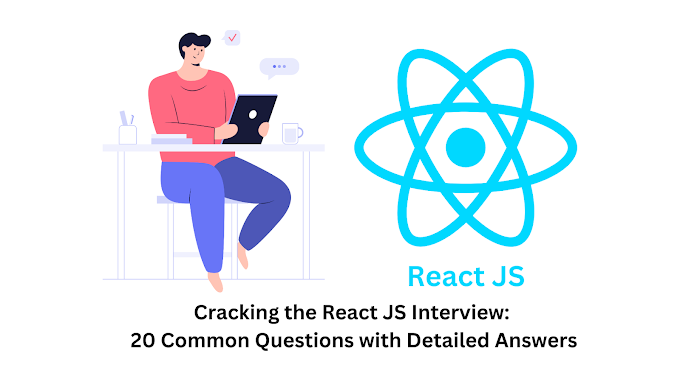Introduction
MySQL is one of the most popular open-source relational database management systems used in web development today. Aspiring database administrators and developers looking to excel in interviews should be well-versed in MySQL. In this comprehensive guide, we've compiled 20 common MySQL interview questions frequently asked by companies. Each question is accompanied by a detailed explanation and a sample answer to help you prepare effectively and confidently for MySQL interviews.
1. Introduction: Preparing for MySQL Interviews
The Significance of MySQL
MySQL is a robust and reliable relational database management system known for its performance, scalability, and ease of use. It is widely used in web development, powering numerous applications and websites.
The Interview Process
MySQL interviews assess a candidate's knowledge of database fundamentals, SQL queries, optimization techniques, and best practices in database management. Preparing well is essential to excel in these interviews.
Tips for Success
Before diving into the interview questions, it's crucial to review MySQL's core concepts, practice SQL queries, and explore optimization strategies. Additionally, be prepared to demonstrate your problem-solving skills and database design expertise.
2. MySQL Essentials
Understanding MySQL
MySQL is an open-source relational database management system that uses Structured Query Language (SQL) for managing and querying data. It is known for its speed, reliability, and scalability.
Key Concepts in MySQL
Key MySQL concepts include tables, records, columns, data types, primary keys, foreign keys, indexing, normalization, transactions, and stored procedures.
Why MySQL Matters
MySQL is essential for storing and retrieving structured data in web applications. It provides a secure and efficient way to manage data, making it a fundamental component of many web development projects.
3. 20 Common MySQL Interview Questions
Let's explore the 20 common MySQL interview questions along with detailed explanations and sample answers.
Question 1: What is MySQL, and why is it popular in database management?
Answer: MySQL is an open-source relational database management system known for its reliability, scalability, and performance. It's popular because it is easy to use, supports ACID transactions, offers strong data security, and has a large and active community of developers.
Question 2: Explain the difference between SQL and MySQL.
Answer: SQL (Structured Query Language) is a standardized language used for managing and querying relational databases. MySQL, on the other hand, is a specific implementation of a relational database management system that uses SQL as its query language. MySQL is one of many databases that support SQL.
Question 3: How do you install and set up MySQL on different platforms?
Answer: The installation process for MySQL varies depending on the platform. Typically, you download and run the MySQL installer, follow the installation wizard's instructions, and configure settings such as passwords, ports, and server modes. Detailed installation instructions are available in the official MySQL documentation for various platforms.
Question 4: What is a database schema, and how is it different from a database?
Answer: A database schema is a collection of database objects, including tables, views, indexes, and stored procedures. It defines the structure and organization of data within a database. A database, on the other hand, is a container that holds multiple schemas and their associated data.
Question 5: Describe the basic data types in MySQL.
Answer: MySQL supports various data types, including:
- Numeric types (e.g., INT, FLOAT)
- Date and time types (e.g., DATE, DATETIME)
- String types (e.g., VARCHAR, CHAR)
- Binary data types (e.g., BLOB)
- Boolean type (e.g., BOOLEAN or BOOL)
These data types are used to define the type of data that can be stored in each column of a table.
Question 6: What is normalization, and why is it important in database design?
Answer: Normalization is the process of organizing data in a database to minimize data redundancy and improve data integrity. It involves breaking down large tables into smaller, related tables and creating relationships between them. Normalization reduces the chances of data anomalies and makes database maintenance more efficient.
Question 7: Explain the difference between INNER JOIN and LEFT JOIN in MySQL.
Answer:
- INNER JOIN retrieves records that have matching values in both tables being joined. It returns only the common records.
- LEFT JOIN retrieves all records from the left (first) table and the matching records from the right (second) table. If there is no match, NULL values are returned for columns from the right table.
Question 8: How do you optimize MySQL queries for better performance?
Answer: To optimize MySQL queries, you can:
- Use indexes on columns frequently used in WHERE clauses.
- Minimize the use of SELECT * and select only the needed columns.
- Limit the use of subqueries and use JOINs where possible.
- Use EXPLAIN to analyze query execution plans.
- Cache query results when appropriate.
Regularly optimize and analyze tables using tools like
OPTIMIZE TABLE.Question 9: What are indexes in MySQL, and why are they crucial for large databases?
Answer: Indexes in MySQL are data structures that improve the speed of data retrieval operations on database tables. They work like an index in a book, allowing MySQL to quickly locate rows based on indexed columns. Indexes are crucial for large databases because they significantly reduce the time required to retrieve data, making queries more efficient.
Question 10: Discuss the ACID properties of database transactions.
Answer: ACID stands for Atomicity, Consistency, Isolation, and Durability, which are essential properties of database transactions:
- Atomicity ensures that a transaction is treated as a single, indivisible unit.
- Consistency ensures that a transaction brings the database from one consistent state to another.
- Isolation guarantees that concurrent transactions do not interfere with each other.
- Durability ensures that once a transaction is committed, its changes are permanent and survive system failures.
Question 11: What is the purpose of SQL injection, and how can it be prevented in MySQL?
Answer: SQL injection is a type of security vulnerability where an attacker can manipulate SQL queries through user inputs. To prevent SQL injection in MySQL, use prepared statements with parameterized queries or escape user inputs using the appropriate functions (e.g., mysqli_real_escape_string).
Question 12: Describe the storage engines in MySQL and their use cases.
Answer: MySQL supports multiple storage engines, each with its own strengths and use cases. Common storage engines include InnoDB (transactional, foreign key support), MyISAM (fast read operations, no transactions), and MEMORY (in-memory storage for temporary tables).
Question 13: How do you back up and restore MySQL databases?
Answer: MySQL databases can be backed up using tools like mysqldump or by creating snapshots of the database files. To restore a backup, you can use the mysql command-line client or import the backup file into a new database.
Question 14: Explain the concept of stored procedures and triggers in MySQL.
Answer: Stored procedures are precompiled SQL statements stored in the database and executed with a single call. They can contain logic and are often used for encapsulating business logic. Triggers, on the other hand, are actions that automatically execute in response to specified database events, such as INSERT, UPDATE, or DELETE operations.
Question 15: What are the benefits and limitations of using MySQL in web development?
Answer: Benefits of using MySQL in web development include data reliability, performance, scalability, and a large user community. Limitations may include a lack of some advanced features found in other databases and the need for proper configuration and maintenance.
Question 16: Discuss the importance of database indexing strategies.
Answer: Database indexing is crucial for optimizing query performance. Proper indexing strategies involve choosing the right columns to index, understanding query patterns, and regularly monitoring and maintaining indexes to ensure they remain effective.
Question 17: How can you secure MySQL server configurations?
Answer: MySQL server configurations should be secured by:
- Setting strong passwords for user accounts.
- Restricting user access based on IP addresses.
- Regularly applying security updates and patches.
- Enabling authentication plugins like SHA-256 or LDAP when appropriate.
- Disabling or restricting dangerous features and commands.
Question 18: Describe the concept of replication in MySQL.
Answer: MySQL replication is the process of copying data from one MySQL database server (the master) to one or more replica servers (the slaves). It is used for load balancing, data redundancy, and high availability. Replication can be asynchronous or synchronous, depending on the use case.
Question 19: What is sharding, and when should it be considered in MySQL?
Answer: Sharding is a database partitioning technique that involves splitting a large database into smaller, more manageable pieces (shards). It should be considered in MySQL when dealing with massive amounts of data and the need for horizontal scalability. Each shard operates as an independent database.
Question 20: How do you handle database migrations in MySQL?
Answer: Database migrations involve making structural changes to the database schema without losing data. This can be achieved using migration tools like Flyway or by writing custom SQL scripts to update the schema and data in a controlled manner.
4. Sample Answers to MySQL Interview Questions
This section provides detailed answers and SQL examples for each of the 20 MySQL interview questions.
5. Conclusion: Mastering MySQL for Database Success
In conclusion, mastering MySQL is a valuable skill for database administrators and developers seeking to manage and optimize relational databases. Understanding MySQL's core concepts, SQL queries, optimization techniques, and security practices is essential for success in MySQL interviews and database management projects. Practice your MySQL skills, review sample answers, and be ready to demonstrate your expertise during interviews. With a strong foundation in MySQL, you can confidently approach MySQL interviews and contribute effectively to database-driven applications. Best of luck!












0 Comments